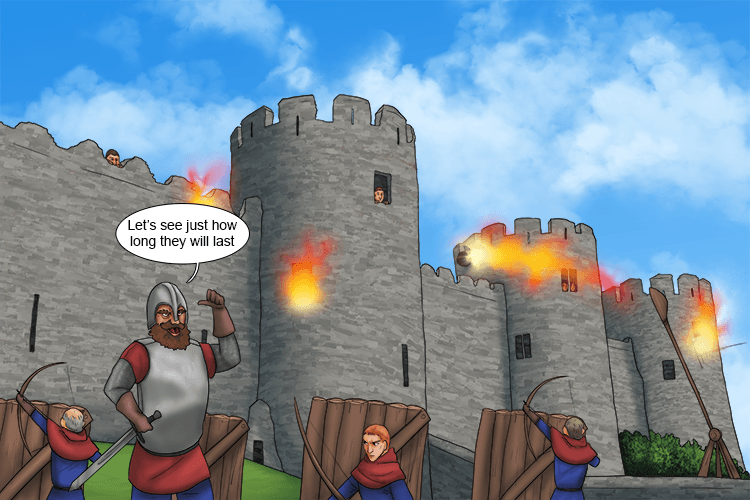Siege def
These examples are programmatically compiled from various online siege def to illustrate current usage of the word 'siege. Send us feedback about these examples. Siegbahn unit. Accessed 15 Mar.
English Dictionary. Word Lists. Grammar English Easy Learning Grammar. Grammar Patterns. English Usage. Teaching Resources.
Siege def
A siege is a military blockade of a city, or fortress , with the intent of conquering by attrition, or by well-prepared assault. This derives from Latin : sedere , lit. Consequently, an opportunity for negotiation between combatants is common, as proximity and fluctuating advantage can encourage diplomacy. A siege occurs when an attacker encounters a city or fortress that cannot be easily taken by a quick assault, and which refuses to surrender. Sieges involve surrounding the target to block provision of supplies and reinforcement or escape of troops a tactic known as " investment " [2]. This is typically coupled with attempts to reduce the fortifications by means of siege engines , artillery bombardment, mining also known as sapping , or the use of deception or treachery to bypass defenses. Failing a military outcome, sieges can often be decided by starvation, thirst, or disease, which can afflict either the attacker or defender. This form of siege, though, can take many months or even years, depending upon the size of the stores of food the fortified position holds. The attacking force can circumvallate the besieged place, which is to build a line of earth-works, consisting of a rampart and trench, surrounding it. During the process of circumvallation, the attacking force can be set upon by another force, an ally of the besieged place, due to the lengthy amount of time required to force it to capitulate. A defensive ring of forts outside the ring of circumvallated forts, called contravallation, is also sometimes used to defend the attackers from outside. Ancient cities in the Middle East show archaeological evidence of fortified city walls. During the Warring States period of ancient China , there is both textual and archaeological evidence of prolonged sieges and siege machinery used against the defenders of city walls. Siege machinery was also a tradition of the ancient Greco-Roman world. During the Renaissance and the early modern period , siege warfare dominated the conduct of war in Europe.
The city is in a state of siege.
Thou hast magnified thy word above all thy name. The setting of an army around or before a fortified place for the purpose of compelling the garrison to surrender; or the surrounding or investing of a place by an army, and approaching it by passages and advanced works, which cover the besiegers from the enemy's fire. A siege differs from a blockade, as in a siege the investing army approaches the fortified place to attach and reduce it by force; but in a blockade, the army secures all the avenues to the place to intercept all supplies, and waits till famine compels the garrison to surrender. Any continued endeavor to gain possession. Love stood the siege, and would not yield his breast. For a complete Scripture study system, try SwordSearcher Bible Software , which includes the unabridged version of this dictionary.
These examples are programmatically compiled from various online sources to illustrate current usage of the word 'siege. Send us feedback about these examples. Siegbahn unit. Accessed 16 Mar. Nglish: Translation of siege for Spanish Speakers.
Siege def
English Dictionary. Word Lists. Grammar English Easy Learning Grammar. English Grammar in Spanish. Grammar Patterns. English Usage. Teaching Resources. Video Guides. Video Learn English.
Craigslist waco tx pets
An attacker's first act in a siege might be a surprise attack, attempting to overwhelm the defenders before they were ready or were even aware there was a threat. The outermost lines, known as the lines of contravallation , would surround the entire besieging army and protect it from attackers. Later, the walls of Babylon , reinforced by towers, moats, and ditches, gained a similar reputation. By about BC, hundreds of small farming villages dotted the Indus River floodplain. The Macedonians built a mole , a raised spit of earth across the water, by piling stones up on a natural land bridge that extended underwater to the island, and although the Tyrians rallied by sending a fire ship to destroy the towers, and captured the mole in a swarming frenzy, the city eventually fell to the Macedonians after a seven-month siege. Homophones, Homographs, and Homonyms. Kids Definition. Collins API. The sentence contains offensive content. Portuguese to English. Fire was often used as a weapon when dealing with wooden fortifications. Your vs. Prehistoric Ancient Post-classical Early modern napoleonic Late modern industrial fourth-gen. However, the cost of building such vast modern fortifications was incredibly high, and was often too much for individual cities to undertake. The greatest advantage of cannons over other siege weapons was the ability to fire a heavier projectile, farther, faster, and more often than previous weapons.
English Dictionary. Word Lists. Grammar English Easy Learning Grammar.
The Guardian In the Dutch case, the possibility of flooding large parts of the land provided an additional obstacle to besiegers, for example at the siege of Leiden. The attacking army would surround a town. During the Warring States period in China — BC , warfare lost its honorable, gentlemen's duty that was found in the previous era of the Spring and Autumn period , and became more practical, competitive, cut-throat, and efficient for gaining victory. The site for constructing the walls and the thickness of the walls in Beijing's Forbidden City were favoured by the Chinese Yongle Emperor r. See lay siege to. Any continued endeavor to gain possession. You're: How to Use Them Correctly. This resulted in extremely prolonged conflicts. From Wikipedia. Siege warfare dominated in Western Europe for most of the 17th and 18th centuries.


You have hit the mark.
Your idea is very good
You are right, it is exact